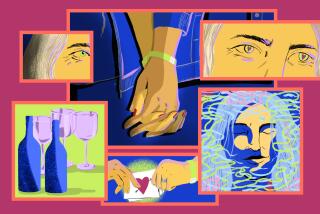Riffing on Relationships : HIGH FIDELITY, By Nick Hornby (Riverhead: $21.95; 304 pp.)
Can pop music sustain a 35-year-old man through one more heartbreak? Ask Rob Fleming, the tell-all narrator of Nick Hornby’s second novel, “High Fidelity,” a book as plaintive, catchy, affecting and rollicking good fun as the best pop songs--which, according to Rob, are “Let’s Get It On,” by Marvin Gaye; “The House That Jack Built,” by Aretha Franklin; “Back in the U.S.A.,” by Chuck Berry; “White Man in the Hammersmith Palais,” by the Clash; and “Tired of Being Alone,” by Al Green.
If you fault Rob for his taste in music, you’re not the only one to judge a person for his/her record collection. Rob has followed his teenage bliss to a failing used record store called Championship Vinyl on a quiet London street where, during the long slow days of waiting for someone to buy the mono copy of “Blonde on Blonde,” Rob and his two music-mad, maladjusted thirtysomething employees, Dick and Barry, bicker and compose Top Five lists of every conceivable preference. Top Five Dustin Hoffman films. Top Five side-one, track-one songs of all time. Top Five sweets that come in jars. These three men have long since hammered it out that “what really matters is what you like, not what you are like.” Customers who request such sappy songs as “I Just Called to Say I Love You,” are routinely driven out of the store.
“High Fidelity,” like any good pop song, is a voice piece: confessional, deceptively simple, haunting and, well, a bit pat. For the most part, it’s a joy ride. The Top Five riffing serves Rob--and the novel--well. The book begins, in fact, with Rob penning his “desert island, all-time, Top Five most memorable split-ups, in chronological order,” a list occasioned by the fact that his girlfriend Laura has ditched him for the guy upstairs.
Rob’s funny, sharp and generally honest internal musings are punctuated by the plaintive, hilarious question: “What came first--the music or the misery? Did I listen to music because I was miserable? Or was I miserable because I listened to music?” and “Is it so wrong wanting to be at home with your record collection?”
There’s an amusing and painful gap between Rob’s willing-to-look-at-everything internal monologue and the stumbling, reactive, often inexcusable way he actually talks to people. When his mother expresses her perception of contemporary mating practices (“I don’t know what happens now. Apart from, you meet someone, you move in together, she goes. You meet someone, you move in together, she goes.”), Rob thinks, “Fair point, I guess.” He says, “Shut up, Mum.”
The particulars of pop music may have provided Rob’s livelihood, the structure of his thought and his guiding principles, but the transition he faces at 35, newly single, deep in a rut, is a near-universal one: Sooner or later, the fiercely held truths embraced early on in life fail to carry you past a certain point. That first pass at life--be it a passion for pop music or higher mathematics or police work--eventually stutters to a stop and begs reexamination.
In America, we call making a life commitment to a person or a job “settling down.” The British call it “sorting things out,” a phrase that adds a sense of parity and removes some of the implied disappointment from the process. In “High Fidelity,” Rob sorts out first himself and his place in the world, then his relationship with his ex-girlfriend Laura.
A systematic soul, he makes Top Five lists, rearranges his records from alphabetical order to the far more personal and idiosyncratic order in which he acquired them. He sleeps with someone else. Then, he systematically hunts down every woman on his Top Five most memorable split-ups list and finds, step by step, that he has been taking those old rejections far too personally.
Sometimes, especially toward the end of the book, it feels as if the author himself is a little too systematic, as if every one of Rob’s issues--from instant infatuations to forcing compilation tapes on his girlfriends--needs to be addressed.
The ending is like the last chorus of “The Last Waltz”: everybody on stage, chiming in. The question is, can we readers--ourselves the cynical melancholic victims of pop music’s imposed misery--suffer such an orchestrated, upbeat, feel-good finale?
More to Read
Sign up for our Book Club newsletter
Get the latest news, events and more from the Los Angeles Times Book Club, and help us get L.A. reading and talking.
You may occasionally receive promotional content from the Los Angeles Times.








